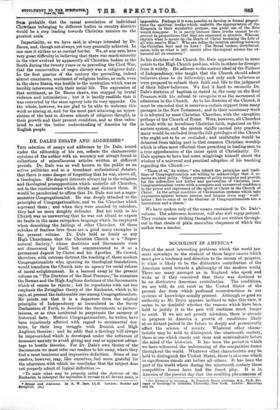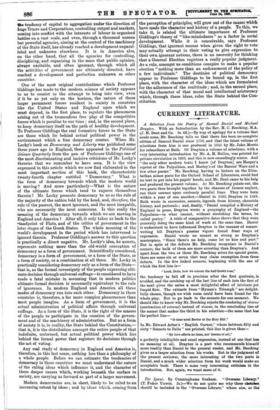SOCIOLOGY IN AMERICA.* ONE of the most interesting problems which
the world pre- sents nowadays to the student of those larger causes which must give a tendency and direction to the stream of progress, is what is likely to be the distinctive contribution of the American mind towards a philosophy of the modern world. There are many amongst us in England who speak and write as if they conceived that there was destined to be no distinctive American contribution. The conditions, we are told, do not exist in the United States of the present day from which profound reconstructions in our systems of knowledge usually proceed. Although so good an authority as Mr. Bryce appears inclined to take this view, it seems to us doubtful whether the reasons which have been held to justify it in the past will continue much longer to exist. If we are not greatly mistaken, there is already in progress in America a growth of conditions likely at no distant period in the future to deeply and permanently affect the science of society. Whatever other charac- teristic may be held to distinguish the nineteenth century, there is one which stands out clear and unmistakable before the mind of the historian. It has been the period in which we have witnessed the unloosening of the competitive forces throughout the world. Whatever other characteristic may be held to distinguish the United States, there is also one which in significance stands out before all others. It has been the part of the world where during the nineteenth century these competitive forces have had the freest play. It is in America of the present day that the resulting phenomenon of ° The Elements of Socloloyy. By Franklin Henry Giddings, M.A.„ Ph.D., Pro- fessor of Sociology in Columbia Utiversity, New York. London : Macmillan and Co. the tendency of capital to aggregation under the direction of huge Trusts and Corporations, controlling output and markets, coming into conflict with the interests of labour in organised battles on a vast scale, and even, through a thousand unseen but powerful agencies, aiming at the control of the machinery of the State itself, has already reached a development unparal- leled and unknown elsewhere. It is in America also, on the other hand, that all the agencies for controlling, disciplining, and organising in the mass that public opinion, always excitable, and often ignorant, through which all the activities of government are ultimately directed, have reached a development and perfection unknown in other countries.
One of the most original contributions which Professor Giddings has made to the modern science of society appears to us to consist in the attempt to bring into view, even if it be as yet only on the horizon, the nature of those larger permanent forces resident in society in countries like the United States and England upon which we must depend, in the first place, to regulate the phenomena arising out of the tremendous free play of the competitive forces which is peculiar to our time ; and, in the second place, to keep democracy itself on the path of healthy development. To Professor Giddings the real formative forces in the State are those which lie behind actual political power in the environment which a free democracy creates. When Mr. Lecky's book on Democracy and Liberty was published some three years ago in England, there appeared in the Political Science Quarterly from the pen of Professor Giddings one of the most discriminating and incisive criticisms of Mr. Lecky's theories that we remember to have seen. It is the view expressed in this article which we now find elaborated in the most important section of this book, the characteristic twenty-fourth chapter entitled " Democracy." What is the form of democracy towards which the modern world is moving ? And more particularly—What is the nature of the ultimate forces which tend to express themselves therein 4 Mr. Lecky presents democracy to us as the rule of the majority of the nation told by the head, and, therefore, the rule of the poorest, the most ignorant, and the most incapable, who are necessarily the most numerous. Is this really the meaning of the democracy towards which we are moving in England and America 4 After all, it only takes us back to the standpoint of Plato, and of the critics of government in the later stages of the Greek States. The whole meaning of the world's development in the period which has intervened is ignored therein. Professor Giddings's answer to this question is practically a direct negative. Mr. Lecky's idea, he asserts, represents nothing more than the old-world conception of democracy as a form of government. Scientifically considered, democracy is a form of government, or a form of the State, or a form of society, or a combination of all three. Mr. Lecky in practically considering democracy only as a form of the State— that is, as the formal sovereignty of the people expressing ulti- mate decision through universal suffrage—is considered to have made a fatal mistake in assuming that in modern politics ultimate formal decision is necessarily equivalent to the rule of ignorance. In modern England and America all three modes of democracy run into each other. Democracy in these countries is, therefore, a far more complex phenomenon than most people imagine. As a form of government, it is the actual administration of political affairs through universal suffrage. As a form of the State, it is the right of the masses of the people to participate in the creation of the govern- ment and of the machinery of administration. But as a form of society it is, in reality, the State behind the Constitution,— that is, it is the distribution amongst the entire people of that indefinite, unformed, but actual political power which lies behind the formal power that registers its decisions through the act of voting.
Any real study of democracy in England and America is, therefore, in this last sense, nothing less than a philosophy of a whole people. Before we can estimate the tendencies of democracy in those countries we must understand the nature of the ruling ideas which influence it, and the character of those deeper causes which, working beneath the surface in society, are carrying us forward as part of a larger movement.
Modern democracies are, in short, likely to be ruled to an increasing extent by ideas ; and by ideas which, coming from the perception of principles, will grow put of the causes which have made the character and history of a people. To this, we take it, is related the ultimate importance of Professor Giddings's theory of " like-mindedness " as a factor in social development. While it is conceivable, says Professor Giddings, that ignorant masses when given the right to vote may actually attempt in their voting to give expression to their own ignorant notions, there is no necessity for thinking that a General Election registers a really popular judgment. As a rule, amongst us conditions conspire to make a popular election " nothing more than an endorsement of the policy of a few individuals." The destinies of political democracy appear to Professor Giddings to be bound up, in the first place, with the character of the ideas which are formulated for the adherence of the multitude ; and, in the second place, with the character of that moral and intellectual aristocracy which, through these ideas, rules the State behind the Con- stitution.



















































 Previous page
Previous page